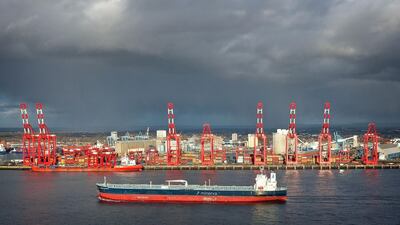Oil markets are poised to tighten in the near term as the prospect of Iranian exports flooding the market is delayed by the Biden administration's domestic priorities, according to Goldman Sachs.
The US investment bank raised its forecast for Brent, the international benchmark, to $65 per barrel by summer, as it expected crude to remain in tight supply due to Opec+ action in the first quarter.
"The new administration’s focus on reaching bipartisan policy support suggest a lessened incentive to quickly revisit the divisive Iran nuclear deal,” the bank said.
“Delays in a full return of Iran production would reinforce our bullish oil outlook since we already forecast a tight 2022 crude market with low Opec spare capacity.”
President Joe Biden's government is focusing largely on domestic issues during its first 100 days in office, including measures to contain the world's largest outbreak of Covid-19 as well as pushing through a $1.9 trillion stimulus package to revive the US economy.
The number of infections around the world are inching closer to the 100 million mark, with 99.4 million cases registered as of Sunday, according to Worldometer, which tracks the pandemic.
The US accounts for more than a quarter of all infections and has recorded 427,635 deaths so far from the virus.
The inward focus will help the continued curtailment of Iranian crude from the market. Oil prices rose by 10 per cent since the start of this year as several nations began to administer the Covid-19 vaccine and as the US edges closer to delivering its stimulus package.
Wood Mackenzie, an Edinburgh-based consultancy, also expects a tighter oil market, revising its forecast for Brent to $60 a barrel by year end.
"The roll-out of an effective vaccine programme, now under way, boosts our confidence that we will see a resurgence in global economic growth this year [gross domestic product growth up 4.6 per cent], which is bullish for oil," said Ann-Louise Hittle, head of macro oils.
"We expect global demand to increase [by] another 6.3 million barrels per day, and to reach just under 99 million bpd by year end, 1 million bpd below the 2019 fourth-quarter peak."
Libyan production, which rebounded last year, has also faced obstacles in recent weeks owing to ageing infrastructure.
A leaking 60-year-old pipeline temporarily halted around 200,000 bpd of production.
Mustafa Sanalla, head of Libya's National Oil Corporation, said the company is looking to foreign investors to rehabilitate its infrastructure as it looks to increase exports.
Libyan production surged to 1.3 million bpd at the beginning of the year after a peace deal between various parties in the North African state brought a nine-month blockade to a halt.


